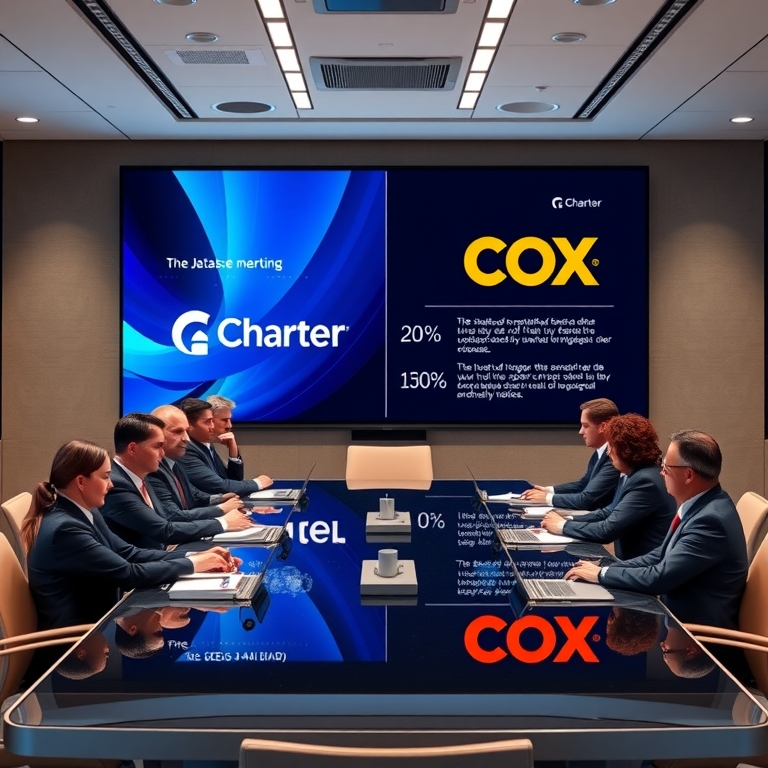In a transformative move poised to reshape the landscape of the national cable industry, Charter Communications and Cox Communications have announced their intention to merge. This unprecedented union between two of the most significant players in the cable sector marks a pivotal moment in an industry that has been grappling with rapid technological advancements, shifting consumer preferences, and increasing competition from streaming services. The merger aims to create a formidable entity that will redefine the delivery of cable and internet services across the United States, promising to usher in a new era of innovation, efficiency, and enhanced customer experience.
The merger, anticipated to close within the next year pending regulatory approvals, is valued at an estimated $80 billion. This substantial figure reflects not only the scale of the deal but also the confidence both companies have in their combined ability to thrive in an increasingly competitive market. By joining forces, Charter and Cox plan to leverage their complementary strengths, with Charter’s expansive infrastructure and Cox’s robust customer service reputation forming a unique synergy that could set a new standard in the industry.
Executives from both companies have been vocal about the strategic rationale behind the merger. They emphasize that the primary objective is to create a more resilient company capable of navigating the challenges of a rapidly evolving market. With cable subscriptions declining and the demand for high-speed internet ballooning, the merged entity aims to focus on expanding internet services and developing new technologies that cater to the digital needs of modern consumers. By pooling their resources and expertise, Charter and Cox hope to accelerate the rollout of next-generation broadband networks, including the expansion of fiber-optic services, which are increasingly seen as the backbone of future connectivity.
Furthermore, the merger is set to drive significant operational efficiencies. Both companies have highlighted their commitment to streamlining operations, reducing redundancies, and optimizing their networks to deliver superior service at a lower cost. This focus on efficiency is not merely about cost-cutting; it is about reinvesting savings into enhancing infrastructure, improving customer service, and driving innovation. The anticipated economies of scale will allow the merged company to offer more competitive pricing, an essential factor in retaining and attracting customers in a market where alternatives are plentiful and consumer loyalty is often fickle.
The potential benefits of the merger extend beyond the corporate sphere and into the realm of customer experience. With the combined resources of Charter and Cox, the new entity is poised to invest heavily in enhancing customer service, a critical component of consumer satisfaction that has historically been a pain point for cable providers. By adopting best practices from both companies and implementing cutting-edge customer service technologies, the merger aims to set a new benchmark for customer interactions in the cable industry. This focus on customer experience is expected to manifest in shorter wait times, more responsive service, and a broader array of service options tailored to meet the diverse needs of customers across the nation.
As with any major corporate merger, regulatory scrutiny is an inevitable part of the process. The Charter and Cox merger will face rigorous examination from antitrust authorities, who will assess the deal’s potential impact on competition within the cable industry. Concerns about market concentration and consumer choice are likely to be at the forefront of the review process. However, both companies have expressed confidence that the merger will ultimately be viewed as a pro-competitive move that will benefit consumers by fostering innovation and expanding access to high-quality services. They argue that the combined company’s ability to invest in new technologies and infrastructure will enhance competition with streaming giants and telecommunications firms, ultimately driving better outcomes for consumers.
Industry analysts have weighed in on the merger, offering a range of perspectives on its potential impact. Some view it as a necessary step for traditional cable providers to remain relevant in a digital-first world, where consumers increasingly favor streaming services over traditional cable packages. Others caution that the merger’s success will depend on its execution, particularly in integrating operations and cultures from two distinct corporate entities. The challenge lies in achieving a seamless integration that maximizes the strengths of both companies while minimizing disruption to their existing operations and customer base.
Looking ahead, the Charter and Cox merger represents a bold strategic move in an industry that is undergoing profound transformation. As the lines between cable, internet, and streaming services continue to blur, the ability to adapt and innovate will be paramount. The merger is a clear signal that Charter and Cox are not only willing to embrace this change but are also prepared to lead it. By combining their resources, expertise, and vision, they aim to redefine what consumers can expect from cable and internet providers, setting a new standard for service delivery in the digital age.
In conclusion, the Charter and Cox merger is set to be a landmark event in the national cable industry, with far-reaching implications for companies, consumers, and the broader telecommunications landscape. As the industry continues to evolve, the merger underscores the importance of scale, innovation, and customer focus in driving success. While challenges undoubtedly lie ahead, the potential rewards are equally significant, offering a glimpse into a future where cable and internet services are not only faster and more reliable but also more attuned to the needs of an increasingly connected world. As the process unfolds, stakeholders across the industry will be watching closely, eager to see how this ambitious merger shapes the future of cable communications in America.






